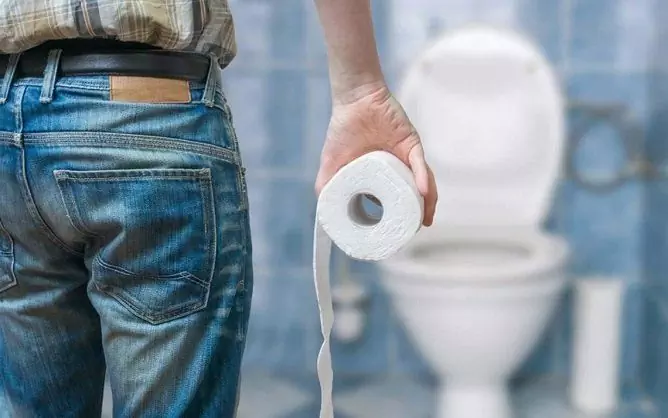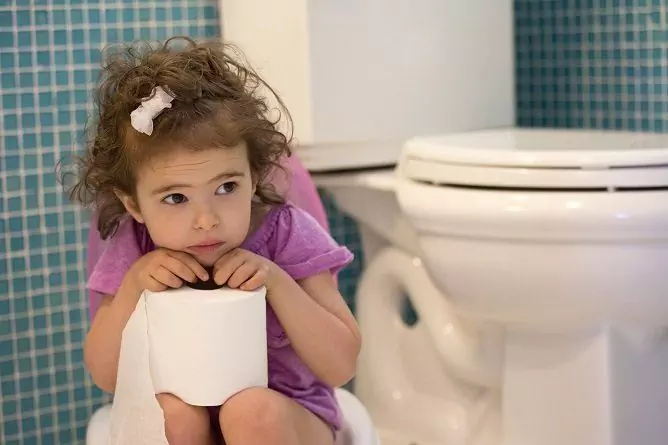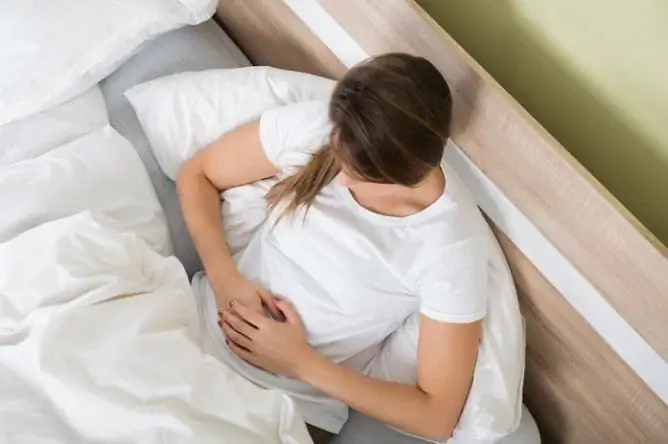- Author Rachel Wainwright wainwright@abchealthonline.com.
- Public 2024-01-15 19:51.
- Last modified 2025-11-02 20:14.
Constipation in children 2 years old
The content of the article:
- What it is
-
Constipation in a child 2 years old: causes
- Functional reasons
- Organic causes
- The main symptoms
- Diagnostic methods
-
Treatment of constipation in children 2 years old
- Recommendations for home treatment
- Diet
- Laxatives
- Folk remedies
- Video
Constipation in a 2-year-old child can occur for various reasons, both functional and organic. At the age of two, about every 4th child faces a problem. This could be due to psychological factors, such as attending kindergarten, or serious bowel disease. If defecation disorder occurs rarely, and the physical condition of the baby is not disturbed, you can limit yourself to treatment at home. Persistent constipation should alert parents, the child must be examined to exclude organic pathology.

Constipation in young children is said in the absence of daily bowel movements
What it is
Due to the immaturity of the digestive system in babies, food passes through the gastrointestinal tract faster. If in adults, constipation is considered to have a bowel movement less than 1 time in 3 days, then in children aged 2 years, stool less than 1 time a day is considered a deviation from the norm.
Constipation in a child 2 years old: causes
All the reasons that can lead to stool retention are divided into 2 large groups - functional and organic. Functional causes lead to dysfunction of the intestine, but its structure does not change. Organic causes may be due to structural abnormalities, inflammation, infection, or neoplasm.
Functional reasons
With functional constipation, the nervous or humoral regulation of intestinal activity is disturbed. This condition can be caused by a number of reasons - nutritional, psychological and physiological.
|
Group of reasons |
Explanation |
| Alimentary |
Among the alimentary reasons (related to nutrition), the following are distinguished: · Insufficient fluid intake; · Lack of fiber in the diet; · Violation of the diet; Excessive consumption of fats and proteins; · Pureed dishes prevail in the diet. |
| Psychological |
Psychological factors can also lead to stool retention in a baby: • stress associated with going to the toilet at home or in the kindergarten; • fear of the pot due to painful sensations; • protest containment when the child does not empty to attract the attention of the parents. |
| Physiological | Constipation in a young child is often caused by a violation of intestinal motility - a peristaltic wave is weak or strongly pronounced antiperistalsis (movement of feces in the opposite direction). |
Organic causes
With organic constipation, there are any structural changes in the intestine - stenosis, pathological expansion, swelling, polyps, inflammation. In children 2 years of age, stool retention is often caused by the following diseases:
| Name of the disease | Description |
| Hirschsprung's disease | A congenital disease in which there are no nerve endings in the area of the colon, which leads to the absence of peristalsis in this area. The main symptom of the disease is persistent constipation that appears from the birth of a baby. |
| Dolichosigma | A disease in which the sigmoid colon is lengthened. Due to the lengthening of the intestine, fecal masses accumulate. |
| Megacolon | A disease characterized by an enlarged colon. With a congenital form of the disease, symptoms (difficulty in defecation, flatulence, abdominal pain) occur from birth. |
| Colitis | Stool retention can be caused by inflammation of the large intestine - colitis. Colitis can be caused by an intestinal infection or the development of inflammation against the background of structural abnormalities of the colon. |
| Colon stenosis | With stenosis (narrowing) of the intestine, the passage of feces is difficult. In young children, stenosis of the large intestine is congenital. |
| Tumors | Tumors and polyps of the intestine narrow its lumen, which leads to stool retention. |
Organic causes are not limited to the gastrointestinal tract. Constipation is often a symptom of a disease in another system. For example, stool retention is a common symptom of congenital hypothyroidism (decreased thyroid function) and rickets.
The main symptoms
The main symptom of the disease is bowel movements less than 6 times a week. In this case, defecation is accompanied by difficulty, it is necessary to use additional manipulations.
With chronic constipation, symptoms of intoxication may develop - the child becomes lethargic, drowsy, does not want to play, refuses to eat. With acute constipation, a child may have a severe stomach ache - he screams, cries, wriggles.
Diagnostic methods
With frequent constipation, be sure to contact your pediatrician. The doctor will examine the child and, if necessary, prescribe an additional examination - stool analysis, X-ray examination of the intestines. During a physical examination, the doctor palpates the abdomen, examines the anal area, and checks the anal reflex.
| Diagnostic method | Who is the study indicated for? | Description of results |
| Coprogram | All patients |
The first analysis that is prescribed for defecation disorders is a coprogram. What changes in the analysis are characteristic of pathology: • feces hard, dense; · Rounded shape, in the form of balls; · Little digested fiber; · Leukocytes and squamous epithelium can be determined. |
| Analysis of feces for eggs of worms | All patients | It is prescribed to exclude helminthic invasion, which can also be the cause of stool retention in the baby. |
| General blood analysis | All patients |
It is prescribed to detect signs of inflammation, helminthic invasion: With inflammation, an increase in leukocytes and ESR is determined; With helminthic invasion - an increase in eosinophils. |
| Irrigoscopy | If you suspect an organic pathology | It is indicated for suspected structural abnormalities of the intestine. A contrast agent is injected into the rectum, then a series of X-rays are taken. With the help of an irrigoscopy, it is possible to identify the expansion or lengthening of the colon, the presence of polyps and tumor formations. |
| Colonoscopy | If you suspect an organic pathology |
Endoscopic examination of the large intestine. The endoscope is inserted into the rectum and the intestinal mucosa is examined. It is possible to identify changes in the mucous membrane, ulcers and erosion. Also, a colonoscopy makes it possible to conduct a biopsy. Colonoscopy is a traumatic research method, therefore it is rarely used in children. |
Treatment of constipation in children 2 years old
Treatment is not limited to only one method of treatment, an integrated approach is used. With functional constipation, diet therapy, active games, massage, the formation of a defecation regime, psychological work with the child are used. If non-drug treatment does not work, the child can be treated with home remedies and laxatives (strictly under medical supervision).
Recommendations for home treatment
In about half of the cases, it is possible to normalize the bowel function without the use of medications, for this you need to correct the baby's lifestyle. What can be done at home:
- Give your child more to drink. Lack of fluid often makes it difficult to defecate. How much water to give per day depends on the weight - 50 ml of water is required for 1 kg of weight.
- Form a baby's bowel movement. Organize a comfortable and convenient toilet, do not allow negative emotions during the act of defecation. Teach your baby to have a bowel movement at the same time.
- Avoid the morning rush, the child should take his breakfast slowly.
- Children often have atonic constipation, so they need to maintain an active lifestyle. Spend more time outdoors, play active games, and limit your time watching TV.
- Reflex stimulation will help get rid of symptoms - before eating, do a gentle massage of the abdomen clockwise for 5 minutes.
Diet
To normalize bowel function, you need to eat right. For a baby aged 2 years, fractional meals are recommended 6 times a day - 3 main meals and 2 snacks.
What foods have a positive effect on the condition of the intestines:
- Contains fiber: fresh vegetables and fruits, berries, herbs, bran, rye bread.
- Fermented milk products that improve intestinal motility and prevent dysbiosis: kefir, yogurt, yoghurts without additives.
- Sources of potassium: prunes, figs, raisins, dried apricots.
- Oatmeal and buckwheat porridge.
It is necessary to limit the use of foods that inhibit the emptying of the intestines - strong broths, semolina porridge, jelly, mashed soups. Chocolate, pastries, smoked meats should be completely excluded from the diet.

To treat constipation in babies, it is important to adjust nutrition and ensure a favorable psychological climate
Laxatives
If non-drug treatment is ineffective, medications with laxative effects can be used.
They should be used carefully, as side effects may develop - addiction, dehydration, allergic reactions. Before using laxatives, be sure to consult a pediatrician and carefully follow the instructions.
What laxatives can be used in babies aged 2 years:
- Oils with a softening effect - castor, vaseline, sea buckthorn. They can be given by mouth or administered rectally as suppositories.
- Herbal laxatives. These are mild laxatives that contain senna leaves or rhubarb root - Senade, Senadexin.
- Prebiotics with a mild laxative effect (based on Lactulose).
Folk remedies
Often, folk recipes based on medicinal herbs or food are used to treat constipation.
| Name | Recipe | How to use |
| Prune decoction | Rinse 50 grams of prunes under water, pour a glass of boiling water and cook for 15 minutes. Strain, let cool. | 50 ml 3 times a day 30 minutes after meals. |
| Rhubarb root infusion | 1 tbsp. l. rhubarb root, pour 1 cup boiling water, leave for 12 hours. | 1 tbsp. l. before bedtime. |
| Flax seed infusion | 2 tbsp. l. pour flax seeds with boiling water, let it brew for 8 hours. | 1 tbsp. l. 3 times a day before meals. |
Video
We offer for viewing a video on the topic of the article.

Anna Kozlova Medical journalist About the author
Education: Rostov State Medical University, specialty "General Medicine".
Found a mistake in the text? Select it and press Ctrl + Enter.






